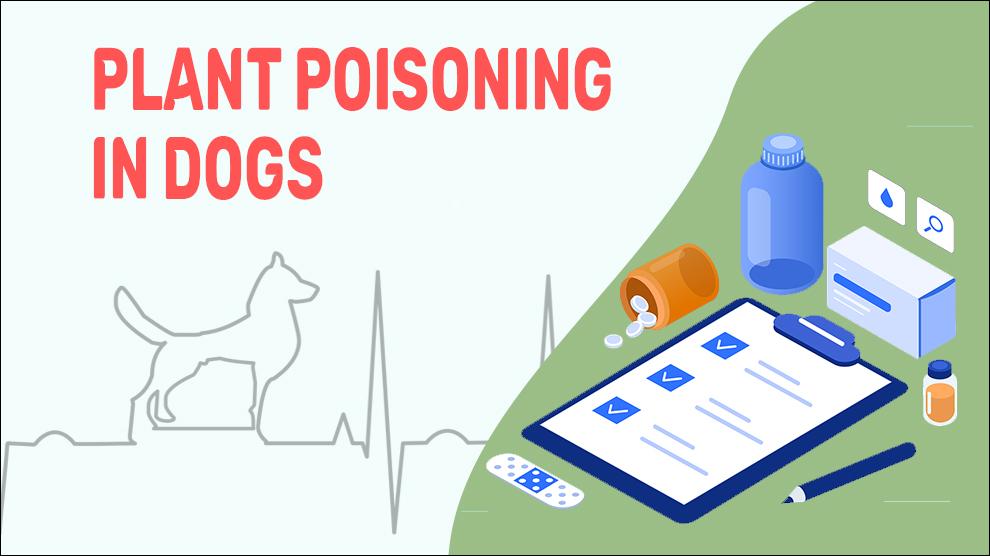What Is Plant Poisoning In Dogs?
Plants add splendor to your home, can make an exquisite decorating statement, help you to sense more in sync with nature, and even possess health benefits. Unluckily, some of the most beautiful and popular indoor plants are toxic to dogs as most pet owners don’t know which ones are safe to play with or to munch on and which totally aren’t. This is significant to know, particularly if you’re buying indoor plants or buying plants online.
Sometimes, plants that humans find medicinal or tasty can be hazardous to dogs if they consume them. And with their inquisitive nature and voracious appetites, it's almost unavoidable your dog will eat, sniff and chew new stuff occasionally. For example, a dog that has an upset stomach may eat grass or another plant to reverse the stomach upset.
In other cases, a dog may like the taste, smell, or texture of a particular flower or plant. There's even a condition called pica, in which dogs crave and eat non-food items that are not normally considered food such as cloth, sandstones, plastic, wood, etc.
One-time or occasional consumption of a small piece of plants or plant products isn’t sufficient to cause severe health concerns in your dog. However, eating some pieces of daffodils or plates full of sliced chives or repeated small doses over time is a cause for concern due to accumulated toxicity.
Symptoms Of Plant Poisoning In Dogs
- Vomiting / Acute hemorrhagic diarrhea
- Dark blood in feces or urine (hematuria) / black or “tarry” stools
- Coughing or difficulty breathing
- Nausea: this looks like drooling in a dog
- Discharge from the eyes and / or nose
- Abdominal pain: Hunching over or guarding the abdomen
- Labored breathing / Bad breath
- Bronchiectasis (the bronchioles damage)
- Excessive thirst
- Excessive urination
- Tachypnea, tachycardia
Treatment Options For Plant Poisoning In Dogs
- For mild ingestion/ within the past 1-2 hours or less, stomach flush or vomiting can be stimulated to eliminate any undigested toxic portions
- Administration of activated charcoal to reduce the absorption of the toxins from the GI tract
- Intravenous fluids flush the toxin from the bloodstream and maintain hydration
- Severe toxicosis may require blood transfusions and supplemental oxygen until the dog’s body generates enough fresh erythrocytes
- For dogs vomiting profusely, antiemetics such as Ondansetron(Zuplenz, Zofran) will be provided
- Appetite stimulants such as Meclizine, Ghrelin Receptor Agonist, CBD (cannabidiol), or Rotisserie Chicken
Home Remedies For Plant Poisoning In Dogs
When your dog is fighting hemolytic anemia (due to chives toxicosis), do not try to use any home remedies.
The home remedies for plant poisoning in dogs start with supplementing the dog are body with enough nutrients to facilitate the synthesis of new RBCs.
Check with your pet dietician for advice about special diets for your dog.
How To Prevent Plant Poisoning In Dogs?
- Keep the canine toxic indoor plants away from the reach of dogs or it is better to get non-poisonous plants
- Make aware of everyone in the household about the plant toxicosis of indoor or garden plants
- Place an appropriate shielding mechanism such as fences around gardens or plant beds containing canine poisonous plants
Affected Dog Breeds Of Plant Poisoning
Puppies. There is no breed disposition.
Causes And Prognosis For Plant Poisoning In Dogs
1. Causes:
The garden plants are the most toxic to dogs
- Aloe Vera (genus Aloe Vera)
- Daffodil (Narcissus)
- Mistletoe (Viscum album)
- Tulip/Narcissus bulbs (Tulipa/Narcissus)
- Lily of the valley (Convallaria majalis)
- Oleander (Nerium oleander.
- Chrysanthemums (including Daisies)
- Castor bean or castor oil plant (Ricinus communis)
- English Ivy, both leaves and berries (Hedera helix)
- Thorn apple or jimsonweed (Datura stramonium)
2. Morbidity:
If large amounts of poisonous leaves or flowers are ingested, plant toxicosis may manifest within minutes of consumption; however, usually, clinical signs develop after a few days.
3. Differential diagnoses:
This includes other common toxicoses:
- Acetaminophen
- Brassicaceous vegetables
- Pesticides/ insecticides
- Benzocaine
- Propylene glycol
- Naphthalene
- Dl-methionine
- Heavy metal poisoning
- Vitamin K3
4. Mortality:
When a dog consumes plants or products more than half a percent of its body weight, then, it is possible that they are at risk of poisoning and if left untreated, it would be fatal.
5. Diagnosis:
- A complete blood count (CBC), chemistry profile
- Urinanalysis
- Necropsy and histologic findings
6. Prognosis:
The prognosis for mild exposure to plant or plant products is really good and the dogs will recover soon. When dogs ingest poisonous plants more than they are supposed to then it can be serious, particularly without appropriate treatment. When you infer that your pet has consumed an excessive amount of plants, get to the vet right away even if there are no immediate signs.
When To See A Vet For Plant Poisoning In Dogs?
Contact your vet right away, if you notice any of the following:
- If you suspect that your dog has eaten excessive plants
- Excessive vomiting and diarrhea
Food Suggestions For Plant Poisoning In Dogs
- Lean meats: Lean beef (top loin, Tenderloin, ground round, and sirloin tip); 90% (or leaner) meat (beef, turkey, chicken)
- Probiotics (Goat's Milk, kefir with live cultures, yogurt, fermented vegetables, etc)
- Use lamb/beef bones in broth (or Chicken soup bone broth)
- Antioxidant berries such as blueberries, Strawberries
- cruciferous vegetables, such as Cabbage, collards, broccoli, cauliflower, and kale
Conclusion
The age, size, breed, and overall health decide the plant toxicosis levels. Low doses of poisonous plant ingestion that is treated immediately have an excellent prognosis, but consumption of large amounts has a poor prognosis.

















